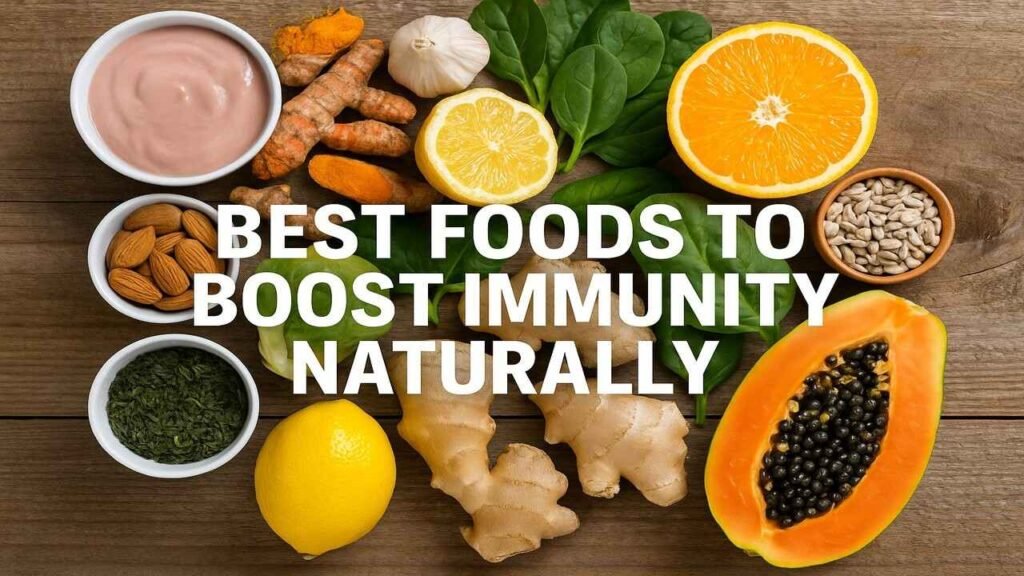A strong immune system is your body’s natural defense against infections, viruses, and chronic diseases. In today’s world, with increased exposure to pollution, stress, and unhealthy lifestyles, maintaining immunity has become more important than ever. While genetics and overall health play a role, diet is one of the most powerful tools you have to strengthen immunity. The food you eat directly impacts how well your body can fight infections and recover from illness.
This article explores the best foods that boost immunity naturally, backed by scientific research. By adding these nutrient-rich foods to your daily diet, you can improve your body’s natural defense system and enjoy better long-term health.
1. Citrus Fruits
Citrus fruits like oranges, lemons, grapefruits, and limes are among the best natural sources of vitamin C, a nutrient well-known for its immune-boosting properties. Vitamin C increases the production of white blood cells, which are essential for fighting infections. It also acts as a powerful antioxidant, protecting cells from damage caused by free radicals.
Since the body does not produce or store vitamin C, it’s important to consume it daily. A glass of fresh orange juice in the morning or simply adding lemon to your water can make a significant difference in your immune health.
2. Garlic
Garlic has been valued for centuries for its medicinal properties. It contains compounds like allicin, which have antibacterial, antiviral, and antifungal effects. Garlic helps activate immune cells, improves white blood cell response, and enhances the body’s ability to fight infections.
Studies show that people who consume garlic regularly are less likely to catch common colds and recover faster when sick. Adding garlic to curries, soups, and stir-fries is an easy and delicious way to strengthen your immune system.
3. Ginger
Ginger is another powerful natural food that supports immunity. It contains compounds such as gingerol, which have strong anti-inflammatory and antioxidant effects. Inflammation weakens immunity over time, and ginger helps reduce this impact.
It is also known to reduce nausea, soothe sore throats, and improve digestion, which is closely linked to immune health. Drinking ginger tea or adding fresh ginger to meals can provide daily immune protection.
4. Yogurt and Probiotics
Your gut health and immune system are directly connected. Probiotic-rich foods such as yogurt, kefir, and fermented foods help maintain a healthy balance of gut bacteria. A strong gut microbiome plays a key role in preventing harmful pathogens from entering the body.
Yogurt that contains live and active cultures is particularly effective. It also provides vitamin D, which regulates the immune system and enhances defense against infections. For best results, choose plain, unsweetened yogurt instead of sugary varieties.
5. Spinach and Leafy Greens
Spinach, kale, and other leafy greens are rich in vitamin C, vitamin A, and antioxidants, making them excellent immune-boosting foods. They also contain iron, magnesium, and folate, which support the production of healthy blood cells.
Unlike supplements, leafy greens provide a natural combination of nutrients that work together to enhance immunity. Eating lightly cooked spinach in soups, smoothies, or stir-fried dishes ensures maximum nutrient retention.
6. Almonds and Nuts
Nuts, especially almonds, are a great source of vitamin E, a fat-soluble antioxidant that supports immune cell function. While vitamin C gets most of the attention, vitamin E is equally important for keeping immunity strong.
Almonds also provide healthy fats and protein, which help maintain energy and overall wellness. Just a handful of almonds daily can provide a significant portion of your recommended vitamin E intake.
7. Turmeric
Turmeric contains curcumin, a compound with powerful anti-inflammatory and antioxidant effects. It not only supports immunity but also reduces the risk of chronic diseases. Curcumin improves immune regulation by activating certain white blood cells and antibodies.
Drinking warm turmeric milk (golden milk) or adding turmeric to curries is a traditional and effective way to enhance immune function. For better absorption, turmeric should be consumed with black pepper.
8. Green Tea
Green tea is loaded with antioxidants like catechins, which improve immune cell function and reduce inflammation. Unlike black tea or coffee, green tea provides immune benefits without excessive caffeine.
It also contains the amino acid L-theanine, which helps the production of germ-fighting compounds in T-cells. Drinking 2–3 cups of unsweetened green tea daily is a simple habit to support immunity.
9. Papaya
Papaya is another fruit rich in vitamin C. A single medium-sized papaya provides more than the daily recommended intake of vitamin C. It also contains papain, an enzyme with anti-inflammatory properties, along with potassium, folate, and magnesium, all of which support immune health.
Adding papaya to your breakfast or smoothies not only strengthens immunity but also improves digestion.
10. Sunflower Seeds
Sunflower seeds are small but packed with immunity-boosting nutrients like vitamin E, selenium, and magnesium. Selenium plays a key role in fighting viral infections, while vitamin E improves the activity of immune cells.
They are a great snack option and can also be added to salads, smoothies, or oatmeal for a crunchy immune-boosting twist.
Lifestyle Tips Along with Diet
Food is a cornerstone of strong immunity, but lifestyle factors matter just as much. Getting enough sleep (7–8 hours), staying hydrated, managing stress through yoga or meditation, and exercising regularly all contribute to immune strength. Avoiding smoking, reducing alcohol intake, and maintaining a healthy weight also play a vital role. When combined with an immune-boosting diet, these lifestyle habits create a complete defense system for your health.
Frequently Asked Questions (FAQs)
Q1. Can immunity be built quickly with food?
Q2. Are supplements better than natural foods for immunity?
Q3. Which drink is best for boosting immunity?
Q4. How does sleep affect immunity?
Q5. Can children eat the same immune-boosting foods?
Your immune system is your body’s natural shield, and what you eat directly affects its strength. Foods such as citrus fruits, garlic, ginger, yogurt, spinach, almonds, turmeric, green tea, papaya, and sunflower seeds are among the best natural ways to build immunity. Combined with healthy lifestyle habits like sleep, exercise, and stress management, these foods create a powerful natural defense against illness.
By making small, consistent dietary changes today, you can enjoy stronger immunity, better energy, and long-term health protection tomorrow.





